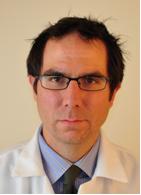
Name: Fredric Pieracci, MD
Title: Fellow, Trauma and Acute Care Surgery
Institution: Denver Health Medical Center, University of Colorado Health Science Center
Clinical Specialty: Trauma, Surgical Critical Care, Acute Care Surgery
Research Interest: ICU Anemia
Webpage: http://denverhealth.org
Institution during SIS Fellowship: New York-Presbyterian Hospital/Weill Cornell Medical Center
SIS Fellowship Mentor: Philip S. Barie, MD
SIS Fellowshp Project Title: A Randomized, double-blind, placebo-controlled trial of the effects of enteral iron supplementation on anemia and risk of infection in during surgical critical illness.
Fellowship Years: 2005-2006
Fellowship Publication:
- Pieracci FM, Henderson PW, Rodney JR, Holena DN, Genisca A, Ip I, Benkert S, Hydo L, Eachempati SR, Shou J, Barie PB. A Randomized, double-blind, placebo-controlled trial of the effects of enteral iron supplementation on anemia and risk of infection in during surgical critical illness. Surg Infect 2009;10:9-19.
- Pieracci FM, Barie PS. Diagnosis and management of iron-related anemias in critical illness. Crit Care Med 2006;34:1898-1905.
- Pieracci FM, Barie PS. Iron and the risk of infection. Surg Infect 2005;6:S41-S46.
- Pieracci FM, Henderson P, Hydo L, Eachempati SR, Shou J, Barie PS. Prevalence of hypoferremia and iron-deficient erythropoiesis in anemic critically ill patients, and correlation with severity of illness. Crit Care Med 2006;34:A132.
How did you hear about the SIS Fellowship? Through my mentor, Dr. Philip Barie. He informed me of the SIS, as well as the Fellowship. He stressed the importance of the opportunity in terms of funding, networking, and building a career as an academic surgeon.
It sounds like he was influential on your choice to become an academic surgeon. Dr. Barie modeled the balance between clinician and academician, stressing translational research and the importance of incorporating evidence based medicine into everyday practice.
How did you get involved in surgical infections research? I began by writing review articles in conjunction with my faculty mentor during surgical residency. I began going to national meetings and became aware of funding opportunities.
Can you describe how the fellowship helped your career? In addition to developing my ability to design and conduct clinical research, publications as a result of the fellowship allowed me to gain notoriety as a presenter at national meetings.
Have you continued this line of research? Did you obtain further research funding in this area? I have recently been awarded a research grant from the National Trauma Institute to conduct a multi-center trial of intravenous iron supplementation of critically ill surgical patients, which will begin this summer.
What would you tell medical students who are interested in surgery? It's a long road, but well worth it. You will not find another dicipline of medicine that combines intellect, technical skill, strong patient relationships, and academia.
What suggestions would you give to residents who would like to pursue research projects? Form a relationship with a mentor early, and be aggressive in terms of getting things done. A good place to start is usually a review article or book chapter to familiarize yourself with the field, and identify areas of knowledge deficiency.
What about obtaining funding? There are many funding oppurtunities. Familiarize yourself with your institution's office of grants and contracting, and suscribe to major funding institutions' (e.g., NIH) e-mail lists to stay abreast of oppurtunities. Almost all investigators have proposals that get rejected (including myself). Don't get discouraged.
How did you first get involved in the Surgical Infection Society? As a resident member upon the request of my residency mentor, Dr. Barie.
What was it like to attend the SIS Meeting as a resident? Do you recall your first presentation there? At first, I was intimidated. However, as I met and spoke with other residents, it became apparent that it was a nurturing and non-judgemental environment. After the initial nervousness surrounding my first presentation subsided, I was envigorated with the prospect of disseminating my research to such a large and prestigious body of academic surgeons. Don’t underestimate a casual introduction at a meeting; such introductions have become the basis for long standing collaborations involving my research.
Why should young investigators get involved in SIS? Networking, networking, networking. Also, funding and publishing opportunities. In my experience, SIS is more intimate than some of the bigger meetings (e.g., ACS), allowing for more personal relationships.